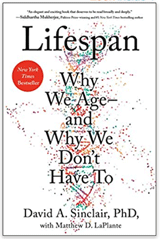 While there are probably many genes and lifestyle choices that will affect your longevity, there is one gene, FOX03, that has been identified as a major contributor to having a long life by a number of prominent scientists (click here for the abstract at NIH). I first heard about it when reading (or rather listening to) the book Lifespan by David A Sinclair.
While there are probably many genes and lifestyle choices that will affect your longevity, there is one gene, FOX03, that has been identified as a major contributor to having a long life by a number of prominent scientists (click here for the abstract at NIH). I first heard about it when reading (or rather listening to) the book Lifespan by David A Sinclair.
Having at least one C instead of a T in the FOX03 gene at location RS2764264 is associated with longevity. So of course I had to look it up in my DNA and that of my family. This is easy to do if you are tested at 23andme. If you have tested elsewhere you need to download the raw data from your DNA test and search it in a text editor or spreadsheet program.
At 23andme, click on your name or image at the top right of the page to get a menu that includes the words Browse Raw Data. Click that option. The next page has a white box where you can type in the name of a gene or SNP. In this case type RS2764264 and see something like the following:
I have highlighted the C/T for this lucky relative of mine who has one copy of the base pair associated with longevity. Some of my relatives have two Cs, but many others, like poor old me, have two Ts.
To find this SNP in your Ancestry DNA raw data that you have downloaded, you need to open it in a program that can handle a large file. Some text editors can do that, but I prefer to use a spreadsheet program and tell it that the data is tab delimited. This same technique will work for wherever you have tested your DNA, provided this SNP is included in the results. At least one of my cousins did not have this SNP in his Ancestry data, perhaps due to an older version of the test.
Here is how it looks in a spreadsheet of the data for a cousin of mine who has two Cs in her Ancestry results: Again the yellow highlight showing you where to look is my addition.
I had been expecting a long life because my father lived to 96 and my mother, a heavy smoker among other abuses, lived to 85 (her sisters lived to 100 and to 94) so I was unpleasantly surprised with my result. On the other hand, since my brother has two Cs, I can infer that both my parents had C/T. Plus all my brother’s children will have at least one C.
So should my financial plan be for an additional 10-15 years now, instead of 20-25 more years? Maybe. The important thing is to have those be healthy and active years, so back to good diet, regular exercise, and my usual supplements ….
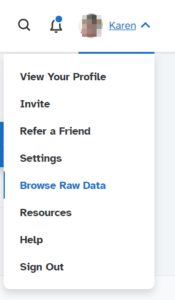
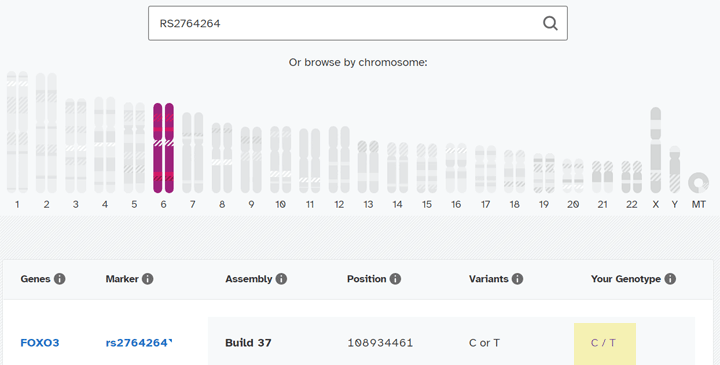
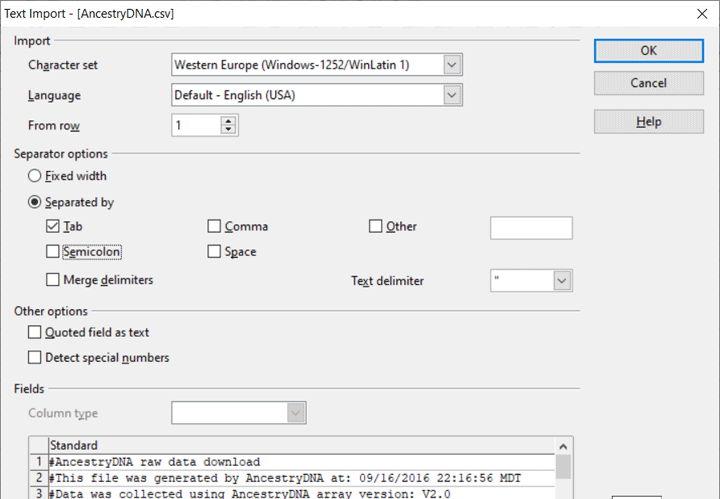
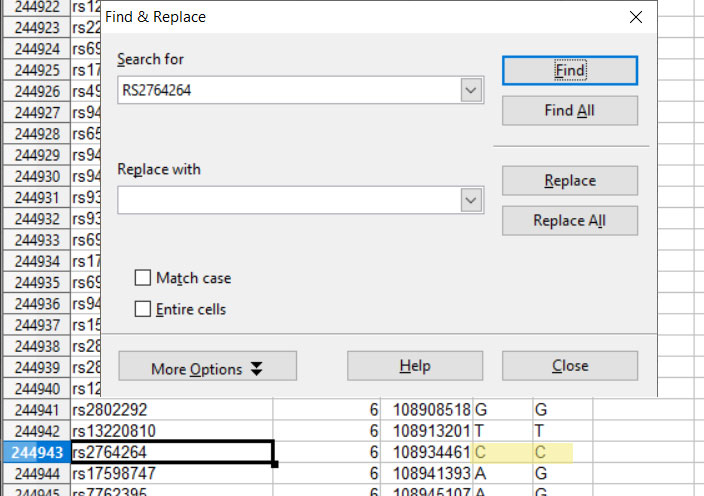
Don’t despair. I just checked my mom’s and she has two Ts. She’s 93, still lives by herself and drives around town. No major health issues, either.
By now I owe you so many glasses of wine neither of us will be sober when we leave the bar. Time to call Lyft. You are a gift that just keeps on giving to the genetic genealogy community. Thanks for your thoughtful posts.
My family and I tested with Ancestry 2016-17. The raw data does not show RS2764264. My parents died at ages 66 & 88. My paternal grandparents at ages 60 & 68, and my maternal grandparents were at 76 & 96. I have 4-30 years left.
Thank you for confirming that older Ancestry tests do not check this SNP. You night consider testing at 23andme for more heath information and more relatives.
Thank you for sharing this; very valuable. Neither my husband, nor I, have a C, just T/T. I will not bother to check my daughter, because even if she has a C, that would be decimated by her 40 years of smoking, starting at age 12.
I have a single C and have had both colon cancer (at 29) and breast cancer (at 40), so there’s loads of ways that the hope for a longer life can get derailed. 🙂
Thank you for this – it confirms my greatest hopes / fears. My father lived to be 99. Both my brother and I have 2 Cs. I’m actively working on improving my body – exercising daily and dieting to shed all those pounds from enjoying life a little too much! Want to be as able and active as my 106 yr old neighbor!
Any thoughts on sharing or not?? I have one C and that is encouraging. I manage several kits — and am inclined to tell one that she also has the longevity gene. I’m inclined to stop there.
THANKS.
Carol, my policy is to check only those close relatives who expect me to check the latest information for their kits. The others whose kits I have the raw data for are being sent this post to and asked if they want me to check.
Thanks. I was curious about my husband — who has only tested at Ancestry and is NOT interested in anything you and I LOVE like DNA and genealogy. I only have the Ancestry file in a “notepad” format and have been killing my eyes scanning the 6th chromosome for that rs number. IF the early Ancestry tests did not include it, I’LL STOP. To triple-check, how do I convert to a “searchable” format?
Use the search function and lowercase the RS but I prefer to use a spreadsheet as shown in the article.
That’s interesting, thanks for posting. I have Build 37, C/T & Build 38, C/T. When you say two C’s I assume that’s C/C, so I guess I have 1 C, which I’m happy to know.
Yes C/C is two Cs …
Thanks so much, Kitty! I have many, many great-great (and further back) grandmothers who lived well into their 90s and assumed I might as well since I am a very healthy 70 already in spite of a not-so-healthy lifestyle. I have 2 Cs! I need to work much harder on staying healthy.
Kitty,
I’m confused. I’ve read the abstract, and it does not mention rs2764264. Where did you find this location?
I got that location from the Sinclair book. You can also see all the references at SNPedia, another favorite source of mine https://www.snpedia.com/index.php/Rs2764264
Thanks Kitty! Does the book estimate how much having one C increases the odds of a long life? It looks like SNPedia only mentions two C’s as increasing the odds (assuming I’m interpreting it correctly).
The book does not estimate but it does imply that even one C confers a big advantage.
Dang! Count me in the double T group. My bio parents are both in their mid-70’s and seem in good health. Will have to take another look at the research to see how their respective parents did. (I’m adopted. He didn’t know she was pregnant. Found and met them individually through a year-ish of research a short time ago. I’m 52)
The book has many strategies for those of us without this gene to use. Try this video of David Sinclair’s research
https://youtu.be/RRdTfh1_88I
Ohh C/T… I better start looking after myself!
Thanks this was interesting and I checked 23andme, I have the C/T